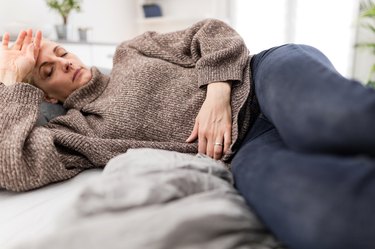
You might be surprised to learn that endometriosis, the condition that causes unwanted tissue to accumulate outside of the uterus, can become so widespread that it affects areas of your gastrointestinal (GI) system. Here's what you need to know.
Endometriosis Stomach Problems
Video of the Day
Up to 10 percent of women of reproductive age are affected by endometriosis, according to an article published in BMJ Case Reports in 2015. About 5 to 10 percent of them experience endometriosis lesions in the bowel, anywhere from the small intestine to the rectum.
Video of the Day
Though rare by comparison to growths on reproductive organs, this is the second most common area to be affected by endometriosis and is most often seen in women just beyond their reproductive years, according to 2018 research published in Advances in Medicine. Gastrointestinal or bowel endometriosis, as it's called, is a form of deep infiltrating endometriosis that causes pain, nausea, bowel dysfunction and other symptoms, states the Endometriosis Foundation of America.
Read more: Gastrointestinal Endometriosis Symptoms
"Endometriosis lesions are superficial, ovarian or deep," explains Mark A. Casillas, MD, a colorectal surgeon at the University of Tennessee Medical Center in Knoxville. Deep infiltrating endometriosis is invasive by nature and brings with it more symptoms than other types of the disease, according to a 2018 study published in BMC Women's Health journal.
Pain is one of the most common symptoms of endometriosis, no matter where it strikes, according to the National Institute of Child Health and Human Development. More research is needed to determine why some women experience more severe pain than others — the size, type and location of the lesion doesn't always determine the level or duration of pain.
Research suggests hormones may play a role. Endometrial tissue outside of the uterus responds to hormones much the same way that tissue within the uterus does. The difference is that inflamed tissue outside the uterus is not shed during menstruation, and this inflammation causes pain. Another potential explanation is that some lesions have nerves within them. The link to the nervous system makes those lesions more sensitive to chemicals in the body that signal pain receptors.
Read more: Painful Uterus After Exercise
Some symptoms of bowel endometriosis do depend on where the lesions are — the rectum, the small intestine, the colon, the lining of the intestines or even the appendix. For instance, if the lesions are in an area called the cul-de-sac, found between the back of the uterine wall and the rectum, you can experience painful sex and extremely painful bowel movements, says the Endometriosis Foundation of America. Lesions in the rectum can lead to painful bowel movements, rectal bleeding and constipation along with back pain. Lesions in the appendix can cause pain, gas and bloating, the foundation adds.
You may also experience nausea, vomiting and bowel obstruction, notes Dr. Casillas. Some gastrointestinal symptoms, including diarrhea, can get worse during menstruation.
Treatment Options
Variables like your age, the severity of your symptoms and of the disease itself as well as the location of the lesions factor into choosing the best treatment.
Medication. The preferred approach is to manage symptoms without surgery, says Dr. Castilla. Over-the-counter drugs, such as NSAIDs, or prescription medications, such as birth control pills, may help. In addition to avoiding the risks associated with surgery, he points out that the potential benefits of medication include being able to address multiple areas at the same time and that it's generally well tolerated, with relatively few side effects. You'll likely need to stay on the medication until menopause, when endometriosis typically eases — any stoppage can bring back symptoms.
Surgery. In some cases, deeply embedded lesions require surgical removal. Or, if medication has not been effective, your doctor may recommend surgery to get rid of lesions. A colorectal surgeon is the specialist with expertise in repairs involving the bowel, colon, rectum or small intestine. Surgery may provide long-term relief, but you could need additional surgeries over time. Surgery also carries the potential for complications, including bowel dysfunction, Dr. Castilla explains. So be sure to ask about all the risks and benefits.
- Mark A Casillas, MD, colorectal surgeon, University of Tennessee Medical Center, Knoxville.
- BMC Women's Health: “Factors associated with deep infiltrating endometriosis versus ovarian endometrioma in China: a subgroup analysis from the FEELING study.”
- National Institute of Child Health and Human Development: “What are the symptoms of endometriosis?”
- Advances in Medicine: “Gastrointestinal and Urinary Tract Endometriosis: A Review on the Commonest Locations of Extrapelvic Endometriosis.”
- BMJ Case Reports: “Deep infiltrating endometriosis of the colon causing cyclic bleeding.”
- Endometriosis Foundation of America: "When IBS Is Really Endometriosis on the Bowel."
- Endometriosis Foundation of America: "Endometriosis Symptoms: Gastrointestinal Distress."
Is this an emergency? If you are experiencing serious medical symptoms, please see the National Library of Medicine’s list of signs you need emergency medical attention or call 911.